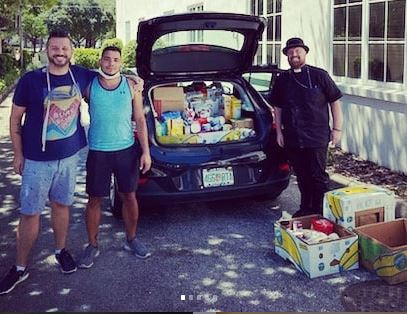When the “shelter-in-place” order was announced for Central Florida, The Rev. Charles Myers of the Episcopal Church of St. John the Baptist in Orlando knew that his church’s mission still needed to move forward.
“The church asked me, ‘Can we keep the food pantry open?’,” he said.
Since the shutdown and services moving online, Myers refocused his efforts on the pantry, which became even more necessary as those in the community lost jobs and income.
“We used to distribute 16-20 food bags, which represented 45-50 people, but we’ve now expanded to giving out 35-40 bags and we have appointments every day,” he said.
The church even delivers the food bags across Orlando and Orange County to those without transportation.
With a background in community organizing, as the pandemic hit, Myers reached out to unions and other contacts to find out who lost their jobs. The church was then connected to aid groups on Facebook, which in turn put St. John the Baptist as “the hub.”
“Word of mouth has been our forte,” he said.
The pantry is expanding the ministry of the congregation to those beyond its walls.
“I don’t care if you come to my church on Sunday, I will help you like I help someone who comes to church every Sunday,” he said. “It’s a way of doing evangelism and missions. We’re busy right now. This is what we’re doing. We’re helping people. We have people who never walked in church coming to tell their stories. We’re consistent. We don’t have a big pantry but we’re consistent in getting their food when they need it.”
He’s not really sure how the Sunday attendance will be impacted after the crisis is over, but that’s not his concern. He wants to preach the gospel through “hospitality, openness,” even if it takes a while for people to connect in a serious way.
“God worked with us, He’s going to work with them,” he said.
Social media has been a big component of the church’s mission these days, he admits. Myers’ social media posts alternate between two types, announcements for where and when to receive food or donate and broadcasting services. When he became pastor last year, he encouraged the church to take broadcasting more seriously and the current climate has been “a catalyst” to improve their visuals. He’s also organizing a “virtual revival” on Facebook with several of his preacher friends called “Turning Toward God, Turning Toward One Another, Even in Isolation.” The series will include a variety of voices from across the country, political persuasions, and denominations.
Myers says even though the technology is modern, the concept is not.
“Even if you look at scripture, Paul is using a structure of letters that everybody did, secular or sacred,” he said. “These are the means by which you can communicate. He was using roads and seaways to preach the gospel. Our social media is a way to communicate.”
Even with a push toward technology and new means of communication, Myers is quick to point out virtual church does not equal the coming together in person.
“Televangelism never replaces the church,” he said. “The new wave never replaces the gatherings or coming together. This fasting of coming together is producing a longing of being together.”
He explained the Eucharist theology has informed his decisions to “be the church” during this crisis. Nearby churches shut their food pantries, but he felt compelled to keep theirs open.
“There’s something about coming together to be the body of Christ. It has forced the church to be present. The church is present in this pandemic and will be present post-pandemic.”
In addition to the food pantry, the church has also hosted a prayer meeting for the unemployed and furloughed workers. There were 100 people in multiple cars in the parking lot, from “all walks of life.” Myers presented a contextualized version of the gospel and blessing. Afterward an organizational director approached him and said, “If you ever wanted to be a priest to all people and that was your goal, you did it today.”

